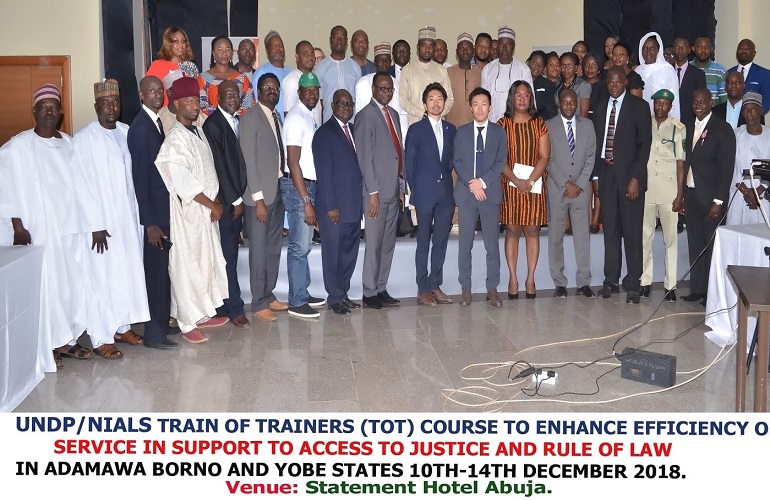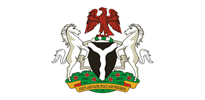NIALS/UNDP Research Project on Support to Access to Justice and Rule of Law in North East Nigeria
Background Concept
The crisis in the North-East region of Nigeria has resulted in widespread displacement, violations of international humanitarian and human rights law, protection risks, and a growing humanitarian crisis, with reports of grave human rights violations which are largely unaddressed and unresolved. The project was conceived to address these issues, and is being coordinated by the United Nations Development Programmes (UNDP); funded by the Government of Japan, and implemented by Nigerian Institute of Advanced Legal Studies (NIALS). The project is focused on bridging the existing gaps by contributing to providing immediate access to justice as part of stabilization and early recovery from conflict. Other key stakeholders/partners in this project namely: National Human Rights Commission (NHRC), Federal Ministry of Justice (FMoJ) and Civil Society Organizations (CSOs), Legal Aid Council (LAC), Defence Headquarters (DHQ), Nigerian Police Force (NPF), Nigeria Bar Association (NBA), Nigeria Prisons Service (NPS).
Objectives and Activities (2017 -2018)
1. Ensuring that compliance with human rights and international humanitarian law form an integral part of the response to the insurgency in the North-East, while recognizing the legitimacy of national security concern of the government;
2. Ensuring that in the returnee communities, there is not only a minimal presence of law enforcement, judicial, criminal justice, and human rights institutions, but that these institutions are adequately resourced to provide effective and timely service delivery especially to the marginalized and traumatized people in the region;
3. Strengthening trust and confidence-building between the security agencies (who have often been accused of committing human rights violations) and communities through an inclusive and participatory approach for all stakeholders in the design, development, and implementation of rights based policing and law enforcement strategies.
4. Strengthening systems to respond to sexual and gender-based violence (SGBV), in full compliance across all sectors with the IASC Guidelines on Integrating GBV Interventions in Humanitarian Action, as well as systems to protect all children and safeguard their best interests.
5. Finally, the project’s work will be integrated into existing UNDP projects in the same communities to ensure the achievement of results and impact.
The project activities started with a Community Based Mapping Exercise (CBME) that determines and confirms the level of presence and accessibility of core security and rule of law institutions in North East Nigeria, which sought to equip appropriate stakeholders with relevant data imperative to strategizing for the provision of timely and effective monitoring, reporting and response to human rights violations particularly those that are sexual and gender based. However, an orientation workshop and training for the CBME was organized before deployment of field officers to the respective states of study. A validation workshop was also organized following their return from the field.
The validation workshop and its findings further spurred training of Health Care Providers on SGBV/Post Exposure Prophylaxis to build the capacity of health providers in the use of post-exposure prophylaxis among clients of sexual and gender based violence (SGBV) and strengthening systems to respond to SGBV, in full compliance across all sectors with the IASC Guidelines on Integrating GBV Interventions in Humanitarian Action, as well as systems to protect all children and safeguard their best interests.
Additionally, a Training of Trainers workshop to enhance efficiency and effectiveness of services in support of access to justice and rule of law was organized at the close of 2018, specifically to build capacity of participants who are expected to undertake training of their colleagues on an ongoing basis to acquire critical knowledge skills that will enhance their efficiency to provide services in support of justice and rule of law in their various communities.
Outputs
• A three-year rule of law project for North-East Nigeria with catalytic access to justice, security and human rights priorities was established to address the effects of conflict in the three most affected States (Adamawa, Borno and Yobe States )
• Nine Community-Based Mapping exercises documented the presence of core justice and security institutions, and recorded the available services.
• Successfully build the Capacity of Health Care Providers from various affected communities on the Screening of Victims of Sexual and Gender Based Violence and administration of Post Exposure prophylaxis and HIV Kits (PEP KITS) to ensure SGBV cases prevention and responses.
• Successfully build the capacity of traditional religious rulers, paralegals, lawyers from various affected communities through a Training of Trainers (ToT) who have undertaken to train their colleagues on an on-going basis to acquire critical knowledge skills that will enhance their efficiency to provide services in support of justice and rule of law in their various communities.
Although the project is ongoing, it should be noted that the major beneficiaries of this project will be the Government of Nigeria (represented by Ministry of Budget and National Planning) and the three North-Eastern states (Adamawa, Borno and Yobe states respectively. The project’s work will be integrated into existing UNDP projects in the same communities to ensure the achievement of results and impact on the communities.

Copyright © 2021 Nigerian Institute of Advanced Legal Studies. All rights reserved.

